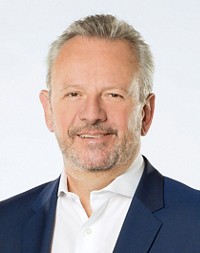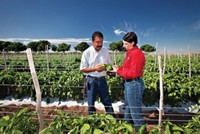Advertisement
Grab your lab coat. Let's get started
Welcome!
Welcome!
Create an account below to get 6 C&EN articles per month, receive newsletters and more - all free.
It seems this is your first time logging in online. Please enter the following information to continue.
As an ACS member you automatically get access to this site. All we need is few more details to create your reading experience.
Not you? Sign in with a different account.
Not you? Sign in with a different account.
ERROR 1
ERROR 1
ERROR 2
ERROR 2
ERROR 2
ERROR 2
ERROR 2
Password and Confirm password must match.
If you have an ACS member number, please enter it here so we can link this account to your membership. (optional)
ERROR 2
ACS values your privacy. By submitting your information, you are gaining access to C&EN and subscribing to our weekly newsletter. We use the information you provide to make your reading experience better, and we will never sell your data to third party members.
Finance
Movers And Shakers
Pierre Brondeau on navigating a shifting chemical industry landscape
FMC CEO reveals how the ability to embrace change has been a key to his success
by Marc S. Reisch
May 18, 2019
| A version of this story appeared in
Volume 97, Issue 20

“I love change,” says Pierre Brondeau, chair and CEO of the agricultural chemical maker FMC, speaking in an office with a panoramic view of Philadelphia. “You can’t get stuck with a single vision when you run a large international corporation. Reality always imposes itself, and then you adjust.”
Vitals
▸ Age: 61
▸ Birthplace: France
▸ Education: BS, Institut National des Sciences Appliquées (INSA) of Toulouse, 1980; MS, University of Montpellier, 1981; PhD, INSA Toulouse, 1983
▸ Professional highlights:
FMC: Chair and CEO, 2010–
Livent: Chair, 2018–
Dow Chemical: President and CEO of Advanced Materials, 2009
Rohm and Haas: President and chief operating officer, 2008–09; executive vice president for electronic and specialty materials, 2006–08; marketing, technical service, and leadership positions at Shipley electronic materials, 1995–2006; plastic additives marketing and research positions, 1989–95
Air Liquide: Technical and marketing positions, 1983–89
▸ Advice: “You can’t get stuck with a single vision when you run a large international corporation. Reality always imposes itself, and then you adjust.”
While Brondeau hasn’t always occupied a corner office, he has always been open to new perspectives and experiences. His willingness to embrace change has given him a significant role in the chemical industry’s restructuring: first when he played a part in Dow Chemical’s purchase of Rohm and Haas and later when he transformed FMC from a chemical conglomerate into a pure-play agrochemical company.
To recognize these accomplishments and other contributions to the chemical industry, the Société de Chimie Industrielle will award Brondeau the International Palladium Medal at a dinner in his honor in New York City on May 22. Thirty CEOs, including Air Products and Chemicals CEO Seifi Ghasemi and retired DuPont CEO Ellen Kullman, have received the biennial award from the industry education group.
“Life is not always a planned journey,” Brondeau observes. Like many young people, he had no idea what career he wanted when he was a university student in France, his native country.
He credits a professor who taught organic chemistry in an interesting way for piquing his interest in chemistry. “Instead of emphasizing rote memorization, he pointed to the logic behind organic chemistry concepts,” Brondeau says. Of his early interest in organic chemistry, he says with a sly smile, “Saying you are an organic chemist sounds like you are smart.”
Brondeau’s PhD in chemical engineering included a specialization in biochemistry, which was a hot topic in the late 1970s. He thought biochemistry would lead him to a job, and it did. Fresh out of the Institut National des Sciences Appliquées of Toulouse, an engineering school, he took a job at the French industrial gas firm Air Liquide, where he did research in a unit exploring waste treatment using both aerobic and anaerobic processes.
He also spent about 3 years with Air Liquide in Chicago, where the firm was building a research center. His job was to develop a lab focused on food research and fermentation processes for the pharmaceutical industry. He later returned to Paris for a marketing job in Air Liquide’s industrial division.
A change from what was starting to look like a conventional career path came in 1989 when Brondeau met Raj Gupta, an executive with the US firm Rohm and Haas. Gupta offered him a job, and he took it. Over the next few years Brondeau worked for Rohm and Haas in positions including marketing, heading a technology lab, overseeing research operations, and helping run Rohm and Haas’s Shipley electronic materials business.
Rohm and Haas “had one of the best on-the-job training programs I’ve ever seen,” Brondeau recalls. By 2008, he was president and chief operating officer, reporting to Gupta, who was then the firm’s CEO. Brondeau had hoped to eventually become CEO himself, but before that could happen, the Haas family decided to sell its 33% share of Rohm and Haas, putting the company into play.
Brondeau, Gupta, and other Rohm and Haas executives believed the company “should stay independent,” Brondeau says. “But you could see there was a point where there was no way around it.”
In July 2008, Dow signed a deal to acquire Rohm and Haas for nearly $19 billion. Dow almost backed out when it failed to raise $9 billion by forming a commodity chemical joint venture with Kuwait’s Petrochemical Industries. However, the two managed to close the deal in April 2009.
It was an emotional time for Brondeau. “There was something special about Rohm and Haas. It was a very high-performing company,” he says. “You knew people will lose their jobs; you knew plants and labs will be shut down.” But after taking a cold, hard look at the situation, he realized, “We had to do it. It was good for shareholders, and we should never forget that.”
Brondeau stayed with Dow for a few months to help with the transition, but he knew he would have to leave if he was to achieve his goal of becoming a CEO. He thought about buying a golf course and about running a winery in the South of France. He also received offers to be CEO from several firms. Brondeau says he chose FMC because he “could see how much potential there was.”
When he joined FMC in 2010, the firm was a hodgepodge of agricultural, specialty, and commodity businesses: insecticides and herbicides, microcrystalline cellulose, carrageenan, alginates, lithium chemicals, soda ash, peroxygens, and phosphorus chemicals. Given his background in specialty chemicals, Brondeau says he thought, “I could really do something. I could create shareholder value and a high-growth company.”
Brondeau assembled a team of executives to assess the future of the $3.1 billion-a-year firm. “The big transformation of FMC started at this point,” he says. “Our view was that a company of our size can’t be good at serving so many different customers.”
The best course of action, they determined, was to focus on agricultural chemicals while building a health and nutrition unit. They planned to spin off the soda ash and lithium businesses into a separate mineral company. The remaining businesses, he says, “we were going to sell or shut down.”
But, as so often happens, the plan changed. In the end, FMC sold its peroxygen business to the private equity firm One Equity Partners for $200 million in 2014 and its soda ash business to Tronox for $1.6 billion in 2015. It spun off the lithium business on its own earlier this year.
Meanwhile, FMC purchased the Danish crop chemicals maker Cheminova in 2014. In 2017, it doubled down on agriculture by acquiring DuPont’s crop protection business. In return, DuPont received $1.6 billion and FMC’s health and nutrition portfolio, including the carrageenan and alginate businesses.
Brondeau says he and his team changed direction when they realized some of their basic assumptions were wrong. The soda ash business was more valuable than they thought and could be sold to help fund FMC’s transformation. Cheminova helped FMC globalize what was an Americas-focused agricultural chemical business, while the purchase of the DuPont business expanded FMC’s agriculture portfolio and beefed up its R&D position.
As had happened before in his career, Brondeau took a different path from the one he first planned. New realities imposed themselves, and he adjusted.
“I’m a better manager in a changing environment than I am when things are in a steady state,” Brondeau acknowledges. “I think we are in a very good place now,” he adds. “We had to adapt.”




Join the conversation
Contact the reporter
Submit a Letter to the Editor for publication
Engage with us on Twitter